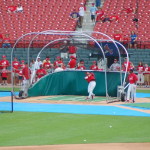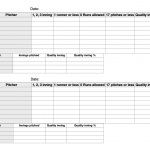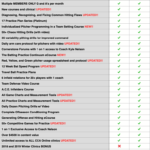Unfair Criticism of John Beilein
I admit that two consecutive posts about college basketball is a bit out of my league. In no way, shape, or form, do I fancy myself an expert on the game of basketball. I retired from playing basketball after my freshmen year in high school, and I have never coached a minute of basketball at any level, but I do believe I know good coaching when I see it. I also believe that I know when criticism of coaching methods is fair and when it is unfair.
On my drive to work this morning, I was listening to the Mulley and Hanley show on 670AM The Score. As with any sports talk show, I will often find discussion points I agree with, and discussion points I disagree with. I took particular issue with the host and callers criticism of Michigan coach John Beilein’s pre game and half time speeches. Their claim was that he was not motivating enough, and lacked emotion. While everyone stopped short of saying that was the reason for Michigan’s loss, I happen to believe that his calm demeanor could be a reason why Michigan was very competitive in that game. Even though there were cameras in his lockerroom, Coach Beilein was less concerned with putting on a show for at home audience than he was ensuring that his team was at the optimal emotional level to compete.
Michigan was one of the youngest teams in the NCAA tournament this year with most of their major contributors being freshmen or sophomores. I recognize that the optimum emotional state playing basketball and baseball are different. Basketball is a sport where emotion and “try hard” can go a long way. In baseball, playing emotionally can be detrimental. Baseball’s optimal level of intensity is playing hard and hustling, but being relaxed and mentally focused. I would argue that a 19 or 20 year old does not need to be motivated by a speech to have an energy level high enough to play in the NCAA National Championship game. The reality is, they probably need to their emotions brought down a notch to perform at their optimal level, and I believe that this is what John Beilein was doing.
Ideally, a team would approach the National Championship no differently than it would a normal game. For a coach to completely ignore the magnitude of the situation would be lying to their players, but a coaching should try to keep the game as normal as possible. I believe Coach Beilein recognized this heightened state of excitement in his young team and was trying to give them a calming, familiar voice to keep their emotions in check and put their bodies in the optimal level for performance.
More from my site
 CCA Podcast 072 – Part 3 of 3 of playing great team defense
CCA Podcast 072 – Part 3 of 3 of playing great team defense In season hitting instruction
In season hitting instruction The how, when, and why of throwing curveballs at the high school level
The how, when, and why of throwing curveballs at the high school level CCA Podcast 242 – Quality Strike/Inning Charts for Pitchers
CCA Podcast 242 – Quality Strike/Inning Charts for Pitchers CCA Podcast 162 – Internal vs. External Cues
CCA Podcast 162 – Internal vs. External Cues CCA Podcast 255 – Developing timing in your hitters, philosophy and drills
CCA Podcast 255 – Developing timing in your hitters, philosophy and drills
 Posted by Kyle Nelson
Posted by Kyle Nelson- Posted in Uncategorized
 Apr, 10, 2013
Apr, 10, 2013 1 Comment.
1 Comment.
Elite members login here
Check out what’s New/Hot!
Recognizing, Diagnosing, and Fixing Common Hitting Flaws eCourse The 3 metrics we tested on Blast motion sensors this year Sneak Peek Inside an Elite Q and A The batting practice continuum Elite Member’s area table of contents 50+ “Chaos” hitting drills
5 sample Chaos hitting drills FREE
Mental Skills and Culture Building The hitting pyramid Welcome Elite Member, Trey! Ideas for a pitcher first practice 12 week bat speed improvement plan Make plans this offseason to have your team playing their best baseball at the end of the year” Top 5 hitting drills to translate practice skill to game performanceHow we used Blast Motion sensors with a team in 2019
What to do if your hitters are overmatched Welcome Elite Member, Tommy! Setting your baserunners up for success Welcome Elite Member, Mike! A consulting call with Elite Member Matt FREE Web Clinic: Developing Athletic, Consistent, Extraordinary Infielders
 Coach Kyle Nelson
Coach Kyle Nelson
John. Good insight – you’re correct!